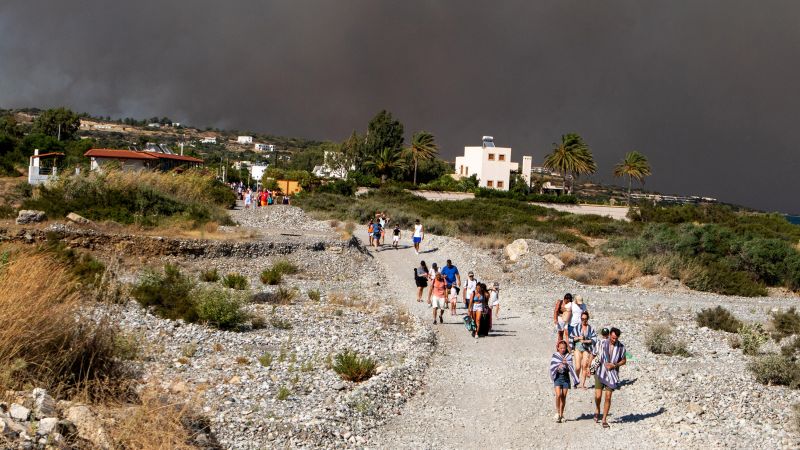Thousands of Tourists Forced to Flee as Wildfire Ravages Greek Island of Rhodes
A massive wildfire is wreaking havoc on the picturesque Greek island of Rhodes, leading to the largest evacuation effort in the country’s history. The blaze, which has been burning since Tuesday, has forced thousands of tourists to abandon their hotels and find safety elsewhere. The situation is chaotic and terrifying, with people having to leave on foot or scramble to find transportation.
Unprecedented Evacuation Effort
Greek officials have described this evacuation effort as the largest in the country’s history. Nearly 19,000 people have been evacuated from Rhodes since Saturday, as the wildfire continues to spread. The situation is made even more dire by the scorching heat wave that Greece is currently experiencing, which experts predict will become the country’s longest on record.
Terrifying Experiences
Eyewitnesses have shared their harrowing experiences of fleeing the island. Amy Leyden, a British tourist, recounted being told to leave her hotel immediately or risk not making it out alive. She and her family had to walk down the road in the middle of the night, with the fire closing in on them. Cedric Guisset, a Belgian tourist, shared a similar story, stating that their hotel was unaware of the evacuation messages they had received on their phones.
Desperate Measures
With little time to spare, tourists have had to leave with only their identity cards, water, and something to cover their faces and heads. The urgency of the situation has left many without a clear plan or destination, adding to the chaos and fear.
The Aftermath
As the wildfire continues to rage, the damage to the island of Rhodes is yet to be fully assessed. The images of the devastation are heart-wrenching, with at least 12 hotels being evacuated. The impact on the local economy and tourism industry is expected to be significant.
Conclusion
The unfolding tragedy on the Greek island of Rhodes is a stark reminder of the destructive power of wildfires. The stories of those caught in the chaos and their desperate attempts to escape serve as a sobering reminder of the importance of preparedness and swift action in the face of such disasters.Discover the Latest Updates on the Ongoing Wildfires in Greece
The wildfires in Greece have prompted the largest evacuation effort the country has ever seen. Over 16,000 people, including tourists and residents, have been transported to safety by land and sea. The situation remains critical as firefighters battle three active fronts in the central and south parts of the island.
Key Details:
– The blaze is currently burning near the areas of Kiotari and Lardos, close to the Lindos archaeological site. So far, the site has not been threatened.
– Hotels, schools, sports centers, and conference centers have been activated in safe areas of the island to accommodate evacuees.
– Greece’s foreign ministry will establish a dedicated helpdesk to assist tourists returning to their respective countries. Tour operators have also arranged charter flights to pick up travelers who wish to leave the island.
– Eight people have been hospitalized due to respiratory problems caused by the wildfires.
– British airline Jet2 and holiday group TUI have canceled all flights and holiday packages to Rhodes due to the ongoing wildfires.
– Thirteen departments, including the Attica region where Athens is located, are under a red alert for wildfires, indicating the highest state of alarm.
– Visiting hours for the Acropolis and other archaeological sites in Athens have been revised due to soaring temperatures. Some staff members are on strike to protest working conditions.
– Greece is experiencing an unprecedented heatwave, with the Director of Research at the National Observatory of Athens predicting 15 to 16 days of extreme heat. The duration of the heatwave may extend beyond this estimate.
Stay Informed and Stay Safe
As the wildfires continue to ravage Greece, it is crucial to stay informed about the latest developments. The government’s efforts to protect citizens and tourists are ongoing, but the situation remains unpredictable. Follow the updates closely and take necessary precautions to ensure your safety.Athens Takes Steps to Protect Tourists and Citizens from Heat Wave
As the blistering heat wave continues to scorch Greece, Athens is taking action to ensure the safety and well-being of both tourists and citizens. With temperatures reaching record highs, the city is bracing for potentially dangerous conditions.
The Longest Heatwave in Greece’s History
According to meteorologist Nikos Lagouvardos, the longest continuous heatwave Greece has ever faced lasted 12 days in July 1987. This serves as a reminder of the intensity and duration of the current heatwave.
Breaking All-Time Temperature Records
Lagouvardos also warns that Athens may break its all-time temperature record this summer. The previous record was set in June 2007, when the city experienced a scorching 44.8 degrees Celsius (112.64 degrees Fahrenheit). With temperatures soaring, it’s crucial to take precautions to stay safe and cool.
Protecting Tourists and Citizens
Athens is implementing measures to protect both tourists and citizens from the extreme heat. These measures include providing cooling stations, distributing water, and offering guidance on how to stay safe in the heat. The city is committed to ensuring the well-being of everyone during this challenging time.
Fierce Heatwave Across the Northern Hemisphere
Greece is not the only country experiencing a heatwave. Large parts of the northern hemisphere are also facing intense heat and soaring temperatures. It’s a global phenomenon that requires attention and action to mitigate its impact.
Stay Informed and Stay Safe
As the heatwave continues, it’s important to stay informed about the latest updates and follow the guidelines provided by authorities. By taking necessary precautions and looking out for one another, we can navigate through this challenging period and ensure the safety and well-being of all.Europe’s Extreme Weather: Hailstorms, Heatwaves, and Thunderstorms
Italy’s Veneto region was recently hit by a ferocious hailstorm, leaving at least 110 people injured. The hailstones were the size of tennis balls, causing significant damage to property and prompting over 500 calls for help. But that’s not all – Italy has also been grappling with scorching temperatures, with the capital city of Rome reaching a record-breaking 41 degrees Celsius. And earlier this year, the country was devastated by floods.
Meanwhile, in the Balkans, severe thunderstorms have claimed lives, adding to the toll of extreme weather events. It seems that Europe is caught in a relentless cycle of unpredictable and dangerous weather patterns.
But what does this mean for the future? Scientists are sounding the alarm, warning that these extreme weather events may just be a glimpse of what’s to come as our planet continues to warm. The intensity of these weather extremes is expected to increase, and our weather patterns could undergo unpredictable changes.
Peter Stott, a climate attribution expert at the UK Met Office, emphasizes the urgency of the situation. He states, “The weather extremes will continue to become more intense, and our weather patterns could change in ways we yet can’t predict.”
As we witness the havoc wreaked by these recent events, it becomes clear that we must take action to mitigate the effects of climate change. The time to act is now, before it’s too late.
Unprecedented Evacuation: Tourists Escape Rhodes Wildfires
Rhodes, the picturesque Greek island known for its stunning beaches, historical sites, and vibrant culture, recently witnessed a harrowing event that left both locals and tourists in a state of shock. Uncontrolled wildfires, fueled by scorching temperatures and strong winds, rapidly spread across the island, prompting an unprecedented evacuation effort to ensure the safety of thousands of visitors.
The wildfires, which broke out on the western side of Rhodes, quickly engulfed vast areas of the island, threatening not only the natural beauty that attracts millions of tourists each year but also the lives of those who were enjoying their summer vacations. As the flames grew more intense and the situation became increasingly dangerous, local authorities, along with the Greek government, swiftly initiated a large-scale evacuation plan.
Tourists, who were enjoying the island’s renowned hospitality and exploring its historical landmarks, were abruptly forced to abandon their plans and seek refuge. Hotels, resorts, and other accommodations played a crucial role in ensuring the safety of their guests, providing immediate assistance and guidance during the evacuation process. The cooperation between local businesses, authorities, and emergency services was commendable, as they worked tirelessly to ensure the smooth and efficient evacuation of all tourists.
The evacuation effort was not without its challenges. The sheer number of tourists on the island during the peak summer season posed logistical difficulties, as authorities had to coordinate transportation and find suitable accommodations for everyone. However, the determination and dedication of the rescue teams prevailed, and within a short span of time, all tourists were successfully evacuated to safe locations.
The impact of the wildfires on Rhodes’ tourism industry cannot be underestimated. The island, which heavily relies on tourism as a major source of revenue, suffered a significant blow as visitors were forced to cut short their vacations or cancel their plans altogether. The loss of income for local businesses, including hotels, restaurants, and souvenir shops, is expected to be substantial. However, the safety and well-being of tourists and residents were rightfully prioritized over economic considerations.
The incident also highlighted the importance of preparedness and effective disaster management strategies. As climate change continues to exacerbate extreme weather events, including wildfires, it is crucial for governments and local authorities to invest in preventive measures, early warning systems, and efficient evacuation plans. The successful evacuation of tourists from Rhodes serves as a testament to the effectiveness of such measures and the dedication of those involved in emergency response efforts.
In the aftermath of the wildfires, the focus has shifted towards recovery and rebuilding. The resilience of the people of Rhodes, who have faced adversity throughout history, will undoubtedly shine through as they work together to restore the island’s natural beauty and revive its tourism industry. The support and solidarity of the international community will play a vital role in this process, as tourists are encouraged to return to Rhodes and experience its unique charm once again.
The unprecedented evacuation of tourists from Rhodes due to the devastating wildfires serves as a stark reminder of the unpredictable nature of natural disasters. It also highlights the importance of preparedness, effective coordination, and the resilience of both locals and visitors in the face of adversity. As Rhodes recovers from this tragic event, it is hoped that lessons learned will contribute to the development of more robust disaster management strategies, ensuring the safety and well-being of all who visit this enchanting island in the future.









